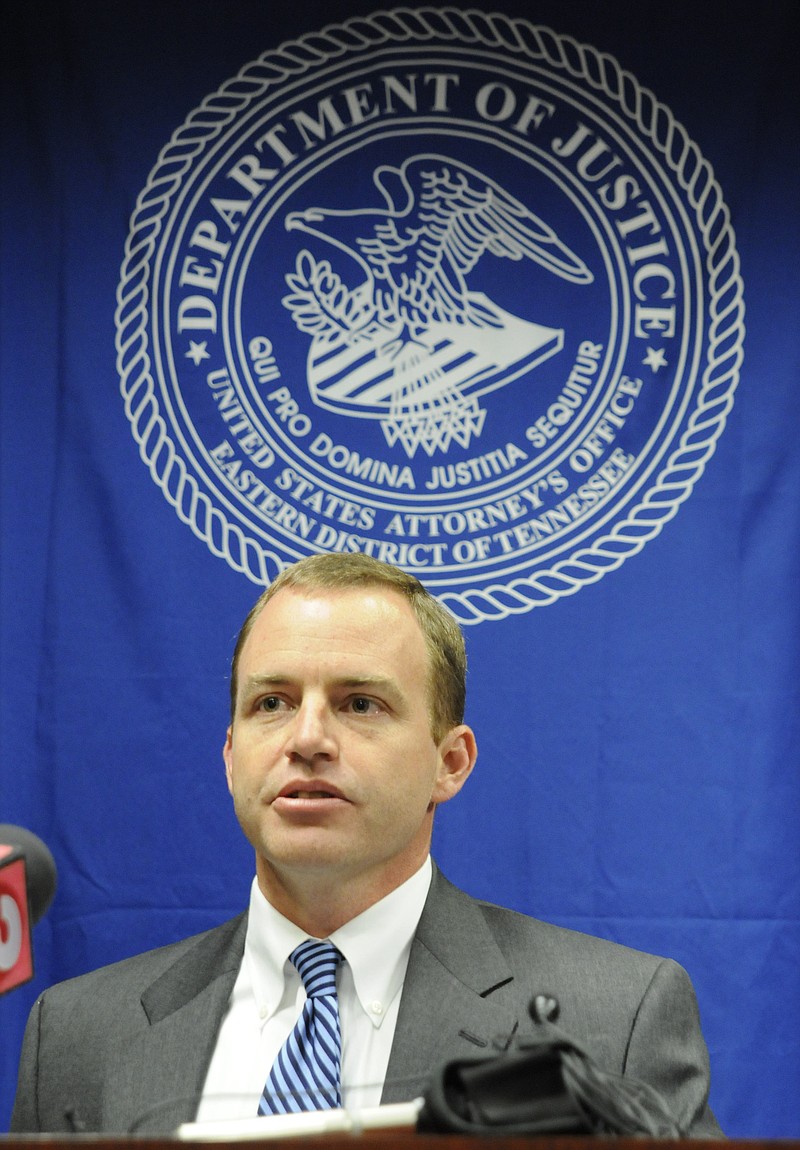Also read
* Council to discuss city's controversial Violence Reduction Initiative next week
While state courts continue to work out the kinks in Mayor Andy Berke's Violence Reduction Initiative, federal agents have quietly prosecuted numerous gang members on gun and drug charges.
Since Oct. 1, 2013, when Berke began unveiling his public safety plan, federal prosecutors have fielded 143 gun, drug and violent crime cases, 78 of which resulted in federal sentences. The other 65 cases are pending, according to numbers released this week to the Times Free Press.
Because prosecutors did not release the defendants' names, the Times Free Press cannot independently track the cases in federal court.
It's also unclear how far along the 65 pending cases are in the legal process. Some defendants could be convicted and simply waiting for a sentencing hearing. Others could be going to trial next week.
A few things are clear, prosecutors say: the majority of these defendants are validated gang members and associates with felony convictions who drive the violence. And police often hand these defendants directly to the cadre of federal prosecutors who are paid by the city to hone in on them.
These defendants are not arrested in VRI enforcement actions and aren't necessarily targeted as part of the mayor's initiative. But to the federal prosecutors who take these cases, that fact doesn't necessarily matter.
"Our position is, all 143 defendants who are related to Chattanooga cases are [there] in an effort to reduce the violence," said U.S. Assistant Attorney Chris Poole, "whether you call it VRI or not."
The $1 million VRI aims to reduce violence by convincing gang members that police and prosecutors will use every legal means at their disposal to target them and ensure they either stop the shootings or end up behind bars for as long as possible. Conversely, officials pledge to offer gang members any social services they need.
In several other cities where officials have adopted this anti-gang strategy, the number of homicides dropped sharply. David Kennedy, the criminologist who developed the strategy, said that would happen in Chattanooga, too. But so far, the city hasn't seen any major drop.
Federal prosecutors released their numbers after the VRI sprang up recently in conversation among city officials.
In early February, City Councilman Yusuf Hakeem wrote a letter saying he planned to withdraw his support of the "failing initiative" after the double homicide of two parents in front of their 5-year-old son.
Two weeks later, a Times Free Press investigation that tracked 229 of the 263 VRI enforcement action arrests through state court found that varied prosecution had resulted in the majority of offenders avoiding long sentences or significant jail time.
Three days after that report, several city council members insisted District Attorney General Neal Pinkston come before them to explain his level of participation.
"I would like [Pinkston] to come and look us in the face and tell us why he doesn't want to get on board with VRI," Councilman Jerry Mitchell said.
Since that time, Public Safety Committee Chairman Chip Henderson has tried to arrange a meeting among Pinkston, Fletcher, Juvenile Court Judge Rob Philyaw, and others.
Defending his office in February, Pinkston said more VRI cases should face federal prosecution, where sentences are typically longer, in order for the initiative to succeed. Data shows most of the 263 VRI cases brought to state court are misdemeanors and are therefore harder to prosecute to the maximum amount of time.
Although the 143 defendants were not arrested as part of VRI enforcement actions, they are involved in gang-member violence, said Chattanooga Police Department Chief Fred Fletcher, who added that federal prosecutors have never turned down one of these cases.
"We're very deliberate about the cases," Fletcher said. "We're not just trying to find guns on felons. We're trying to find guns on felons who are gang members."
Poole and his team then take those cases and present them to the grand jury, which assembles once a month. If the grand jury returns an indictment, it's game on in federal court.
For many years, there was no organized federal team, Poole said.
Poole usually operated solo until October 2013, when the city shelled out $60,000 on prosecutor Meredith Edwards to help prosecute violent crimes.
When Edwards took over for a colleague who went to Washington, D.C., this year, Berke's office started hunting for a replacement in August 2015, city attorney Wade Hinton said.
Six months later, they hired T.C. Makaya, a 32-year-old prosecutor from Dublin, Ga., who started Feb. 8.
The son of two educators who immigrated from Zimbabwe in the 1970s, Makaya has worked as a prosecutor since he graduated from law school in 2008. He lived in Georgia and Wisconsin before relocating to Chattanooga, where his wife is a resident physician at Erlanger hospital.
Last week, Makaya prosecuted his first case in federal court.
After listening to Makaya for two days, a jury deliberated for 40 minutes and found Demetrius Joiner, 29, guilty of being a felon in possession of a firearm. Even though Joiner was convicted and faces up to 15 years in prison, he is grouped into the 65 pending cases.
Until a sentencing hearing on July 20, Joiner will remain in custody, unsure of his fate.
Contact staff writer Zack Peterson at zpeterson@timesfreepress.com or 423-757-6347 with story ideas or tips. Follow @zackpeterson918.
